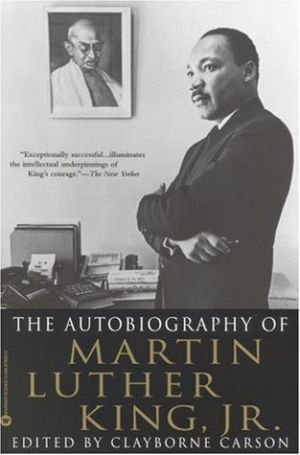The Autobiography of Martin Luther King, Jr.
The Autobiography of Martin Luther King, Jr., was firstly published in August 1986 by Grand Central Publishing. The book was written by Martin Luther King Jr., and edited by Clayborne Carson. The book explains how the journey of Martin Luther King Jr.'s life from his boyhood, education as a minister, leadership in the Montgomery bus boycott, civil rights march in Washington, and relationship with many leaders including Malcolm X, President Johnson, and the Kennedy brothers[1].
Plot

King was born into a religious family in the late 1920s. His childhood is filled with church visits and segregation in Atlanta, Georgia in the 1930s and 1940s. He is well educated for a black American and goes into college. He is influenced by Mahatma Gandhi's work on the nonviolence of resistance to justice. Eventually, King earns his Ph.D. degree in theology from Boston University and marries Coretta Scott. Later on, he is appointed to be a pastor in Montgomery, Alabama. As he becomes the pastor, the racism and discrimination tension is on the rise at the time. Rosa Park's arrest has become a serious issue that leads to the formation of the Montgomery Improvement Association (MIA) expressing the civil rights movement. King is selected to be its leader and he applies the nonviolence resistance principle. The movement that desegregates buses in Montgomery has become successful and extended all over the South. The success soars King's fame as a civil rights activist. King then becomes more proactive in organizing civil rights which leads to the 1964 Civil Rights Act and the 1965 Voting Rights Act that prohibits legal discrimination against black people. King's effort paid off with the Nobel Peace Prize in 1964. As his success spread all across the world, many threats also come to King's campaign. Yet, King creates many relationships with many other civil rights activists although some of them have different points of view or methods in the civil rights movement. His work eventually must end as he is assassinated at the Loraine Hotel in Memphis, Tennessee on April 4th, 1968[3].
Black Empowerment
King aspires many people especially black Americans to have equal rights. What King does is by organizing a march in Washington D.C, from the Washington Monument to the Lincoln Memorial. He assembles 250,000 people where more than 180,000 people are black Americans. The march is organized in a collaborative effort between the NAACP, SNCC, the National Council of Negro Women, and many other civil rights activists. The march is ended with speeches given by leaders of civil rights and the last one is given by King with his speech "I Have a Dream". His speech delivers hope to many Americans and people across the world that hope remains exists where everybody has the same rights, freedom, and justice. His speech is aired on televisions where everyone watches it. His rally is paid off where the Civil Rights Act of 1964 and the Voting Rights of 1965 are issued. This law has ensured that discrimination against black Americans is prohibited and their voting rights are counted the same just like anybody else in the country. King is also honored with the Nobel Peace prize in 1964 and the prize money of 54,000 USD is donated to the Civil Rights movement[4]. His rally on civil rights does not stop, he even goes to slum areas to empower and lift up the life of black Americans and all races. He organizes protests against house discrimination in Chicago in 1965. He also coordinates with many organizations to urge the government to formulate employment and decent jobs for everyone including black Americans in decreasing the poverty among black Americans and other cases. His focus on economic issues has created the authorities such as Chicago Mayor to allocate more money on establishing low-rent housing, banks for black Americas, and integrations of good public schools. King's influence on empowering black Americans has spread across the country and remains to exist up to this day[5].
Controversy
King has faced racism since his childhood like he must give up his seat on a bus for white folk. The struggle is even more difficult when he is becoming more proactive in the civil rights movement. As he becomes the leader of the bus boycott in Montgomery, he is held by racist white police officers, received many harassments and death intimidations, and his house is bombed. While his fame skyrockets, many of his supporters are arrested, beaten, and even died especially when they do a march from Selma to Montgomery. In other states, the white segregationists try to keep the voice of black Americans to be silenced by bombings, imprisonment, and beaten by authorities. After the Voting Act has been issued which legalize the voting rights for black Americans, there are still exists much discrimination in other cases. For instance, black Americans do not have the opportunity to have secure good housing in Chicago, instead, they are only given a slum-based neighborhood. Poverty remains to exist in many modern cities especially the impoverished are black Americans who still have limited access to job opportunities[6].
References
- ↑ The Autobiography of Martin Luther King, Jr.. Goodreads. Retrieved January 30 2021
- ↑ The Autobiography of Martin Luther King, Jr. Book Cover. Goodreads. Retrieved January 30 2021
- ↑ The Autobiography of Martin Luther King, Jr Summary & Study Guide BookRags. Retrieved January 30 2021
- ↑ Triumphs and Tragedies SparkNotes. Retrieved January 30 2021
- ↑ Final Years SparkNotes. Retrieved January 30 2021
- ↑ The Autobiography of Martin Luther King, Jr. Summary SuperSummary. Retrieved January 30 2021